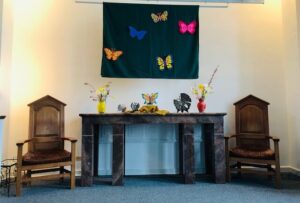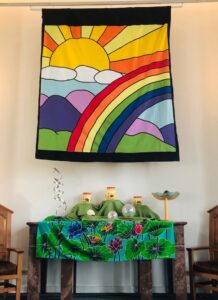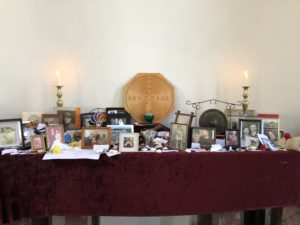As I listened on Thursday to the testimony of Dr. Christine Blasey Ford, I knew that what I’d planned to reflect on this morning had to be set aside. This happens to preachers from time to time. I’ve had it happen as late as while I was stepping into the pulpit. I know someone who says that there’ve been a time or two when they finished composing their sermon when they sat down after delivering it. I at least had a few days, which was time enough to pass a draft by other eyes and hearts. I’m glad I did, because they saved me from my worst inclinations – to fill this time with statistics, and analysis, politics. To avoid, in other words, literally the heart of the matter. The statistics are staggering, yet it’s the stories and the women who tell them that really matters.
Before I go any further, though, I do want to say that while I won’t be talking in any kind of explicit detail, I understand that any discussion of the way(s) our patriarchal, misogynist society degrades and dehumanizes women might be a rough sermon for some people. If you find these reflections bringing up painful things for you, please listen to your body and your heart; reach out to others for support. Rev. Alex is available to listen, as am I, Leia, Chris, and members of our lay Pastoral Visitors. Your Covenant Group might be a safe space. Perhaps a close friend or a member of your family. What I’m getting at is that if your feelings are too large to hold, and if it is all possible, please don’t try to hold them alone.
I also want to say, here at the outset, that I recognize the last thing some of you may want is another straight, white, gender-conforming man pontificating about something that he – that I – really can’t know much about. That’s not quite right. I can know, but I can’t really fully understand, can’t fully comprehend, because I’m a straight, white, gender-conforming man who grew up in this country during the last half century. I know that the anger I’ve felt these past few weeks, the disgust, is nothing compared to the anger, the pain, sometimes the shame, the grief, the fear, the exhaustion so many women have had to carry for their whole lives … which many of you have had to carry.
Over the past year, since the #MeToo movement began, a number of women I’ve known have used Facebook and other social media platforms to tell the story of their experience of sexual harassment, abuse, and assault. All too often it was their stories, in the plural, because so many had more than one. These women courageously, defiantly, wrote about their experience — some for the first time. They wrote of being harassed, attacked, abused, and assaulted by strangers, friends, and family. One friend of mine from high school had a list that began with harassment in elementary school and continued throughout her life.
None of this should have been surprising. I know the statistics — most of you probably do too —they are … alarming (to say the least). Yet I was surprised, and shocked, deeply saddened, and really, really angry that women I’ve known have had to suffer in silence for so long. Have had to suffer with this at all. That’s how oblivious I’ve been able to be — I’ve been able to see, yet not see. The dominant misogynist, white supremacist, classist, heterosexist culture in which we live does such a good job of putting a clean and polished veneer on everything, and is expert at deflecting attention:
Don’t look too hard at those young black men being shot in the streets. Call it an anomaly, a few bad apples — don’t see the systems this violence stems from and supports.
Don’t look too hard at the staggering — and increasing — wealth gap between those with the most and those with the least — don’t see the structures that guarantee this disparity.
Don’t look too hard at the mothers, daughters, sisters, friends, aunts, grandmothers, co-workers, teachers — all those women who have been … and are being … assaulted at a rate that’s equivalent to one act of sexual violence against a woman every 98 seconds. Oh no, don’t look too hard at any of that, and especially don’t look at all the many, many ways ways large and small that women are harassed and abused on a daily, hourly, moment-by-moment basis. These things won’t make the evening news, yet they work together to create the cultural context from within which some men can believe they have the right to treat women as less-than-human, and other men are able (even if unconsciously) to see the truth that’s right in front of their eyes.
In this room there are women who have stories they could tell, many of whom have no doubt never told anyone except, perhaps, a therapist or a very close friend. I imagine that some of these women have lit Candles over the years. These stories are most certainly among those things that have “gone unsaid,” for which we light that last candle each week. So let me say what shouldn’t need to be said but might: these stories — your stories — have a place in the sanctuary of our hearts. To the extent it is possible, we see you, we hear you, and we believe you, even if you never say a word.
“Women” is not a monolithic category, any more than any other group is of one mind at all times. The past few weeks have been hard in a variety of ways, for a variety of reasons. And the last few days? The papers are saying that the nation was “captivated,” “riveted,” by the scene that played out in the Senate. “Captivated?” “Riveted”? Those are words we use to describe action movies and thrillers. “Sitting on the edge of your seat.” Yet this wasn’t a performance. This was just about as clear a distillation of our country’s dominant misogynist culture as anyone could want. It was infuriating, nauseating, forehead slapping how-can-anyone-not-see-what’s-going-on – ing. It was surprising and horrifying for those who’ve been able to avoid the truth of the way women are, and have been, treated in our society. It was wearingly predictable for those who live that truth.
A week or two ago a member of the congregation stood during Joys & Sorrows to share that she had been remembering roughly 25 years ago, during the hearings concerning the nomination of Clarence Thomas to the Supreme Court when he was accused of sexual harassment by Dr. Anita Hill, she and her friends talked about how their generation was going to change things – they were going to raise their sons to reject the patriarchal/misogynist culture that was on such clear display in those hearings, and they would choose partners who already had. That was in 1991, and here we are again. It can feel – it does feel for many – that nothing has changed and that nothing is ever really going to change. And that can lead some women (and some feminist men) to a kind of hopelessness, a demoralization born from decades upon decades of denigration and dehumanization.
There’s a school of thought which says that all sermons must end on a note of hope. A preacher should send the congregation back into the world with inspiration. I’m not sure that I believe that as strongly as some do, yet there is some truth in that. And despite the way things seem right now, many of my female friends have told me that they take hop in the fact that “here” is not exactly the same as it was back then. From the Women’s March, to the #MeToo Movement, to the predicted – hoped for – “blue wave” (which shows every sign of being led by women , and especially women of color), there seems to be a wider and growing awareness today of what has for too long, by too many, been too ignored. And there is a greater willingness to call things as they are or, perhaps, a refusal to let that truth continue to be ignored.
On Thursday the world witnessed a petulant poster-child for patriarchy bluster his was around the thing being unsaid: that straight, white, gender-conforming men (and especially straight, white, gender-conforming men of means) are entitled to use and abuse women in any way that they like just as they are entitled to everything else in life. Kavanaugh – and those male Senators who sat in judgement looking for all the world like the tribunal of Commanders in the Handmaid’s Tale – was a personification of the problem.
And there was Dr. Christine Blasey Ford, who came forward to tell her story knowing the vilification that would be hurled at her like so much excrement. She came forward – in front of the cameras, in front of the world – to speak clearly and courageously about the egregious harm that had been done to her, not only by this man, but also by the society which gave this man permission and which demanded of her acquiescence.
I asked one of my friends who’d shared her story online, sharing parts of it for the first time if she was okay, after sharing so publicly something that had until then been entirely private. She said, simply, that she was ready to share. And whether it’s in a Senate hearing on national television, on a person’s Facebook page, or with a hashtag at the end of a tweet, more and more women are finding themselves “ready to share.” In numbers that would have been inconceivable not all that long ago, women are bravely telling the truth of this culture, the truth that so many just don’t want to acknowledge, and seems as though more people are willing, and able, to listen. In that I pray we can all find some hope.
Pax tecum,
RevWik












